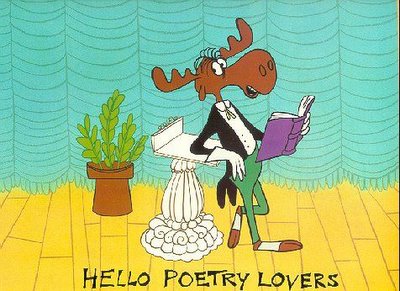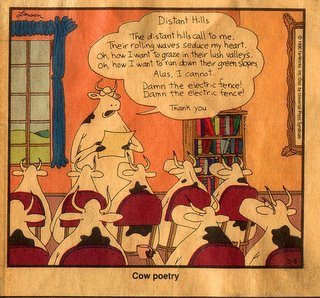
"On Turning Ten"
by Billy Collins
The whole idea of it makes me feel
like I'm coming down with something,
something worse than any stomach ache
or the headaches I get from reading in bad light--
kind of measles of the spirit,
a mumps of the psyche,
a disfiguring chicken pox of the soul.
You tell me it is too early to be looking back,
but that is because you have forgotten
the perfect simplicity of being one
and the beautiful complexity introduced by two.
But I can lie on my bed and remember every digit.
At four I was an Arabian wizard.
I could make myself invisible
by drinking a glass of milk a certain way.
At seven I was a soldier, at nine a prince.
But now I am mostly at the window
watching the late afternoon light.
Back then it never fell so solemnly
against the side of my tree house,
and my bicycle never leaned against the garage
as it does today,
all the dark blue speed drained out of it.
This is the beginning of sadness, I say to myself,
as I walk through the universe in my sneakers.
It is time to say good-bye to my imaginary friends,
time to turn the first big number.
It seems only yesterday I used to believe
there was nothing under my skin but light.
If you cut me I could shine.
But now when I fall upon the sidewalks of life,
I skin my knees. I bleed.
I share this poem with you because of some previous conversations and Ben Felders recent posts. This is an important poem because it speaks so clearly to the loss of imagination. It speaks to the reduction of theology by all of us who wish to "figure it out," map it, GPS it, nail it down, deduce it. This is what we've been taught to do with information we're given. And in it's defence, I am now doing what I argue against with this poem. We do it naturally. It rarely takes second thought. But as we learn to reduce theology to its common denominator, we forget what it was like when we fell in love with the God of Creation, Redemption, and Sanctification. Remember what it was like to become invisible. Remember what it was like when you were an Arabian Wizard and not stuck in the everydayness of your own theology. It was like looking through a window into heaven, Imago Dei tatooed on your face. It was the childlike faith Christ talked about, not some naivete.

Do you remember the first time you read Kierkegaard, Barth, Moltmann, or whomever? Of course you do. But what do you remember more, the theologians who shaped you, or the music you fell in love to. Elvis Costello never fails to move me. Mark Knopfler (of Dire Straights fame) never fails to remind me why I love my wife when I'm away. I love the Beatles song, "I've Just Seen A Face." And considering Emmanuel Levinas' essay "The Trace of the Other" I am moved even more (oops, there I go again). The point is, poetry and art have a clear advantage in speaking with God. It is a prayerful speach that will dance with words far longer than words will dance by themselves.



No comments:
Post a Comment